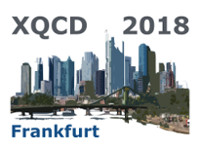Sprecher
Herr
Nicolas Wink
(Heidelberg University)
Beschreibung
For the understanding of the fluctuation measurements in heavy-ion collisions
it is crucial to develop quantitatively reliable dynamical descriptions. In order
to study the phase transition, both in crossover regime as well as near the
conjectured QCD critical point, the non-perturbative nature needs to be fully
included. In this talk, we outline a novel QCD-assisted transport approach based on
non-equilibrium chiral fluid dynamics and the effective action of low energy
QCD. This approach makes use of the full equilibrium correlation functions and
includes dissipation and stochastic noise.
We test the new framework within a low energy effective mesonic theory. For
this case, we discuss the time evolution of fluctuation observables based on
the higher-order moments such as the skewness and kurtosis as the system
passes through the phase boundary. In this way, we can study details of the
equilibration of the order parameter and of higher-order correlations, as well
as the impact of critical slowing down on the correlation length. The
underlying theory naturally includes critical and non-critical contributions.
We can, therefore, explicitly test the size of the critical region, where scaling
and dynamical scaling hold. Finally, the relative effect of critical
versus baseline contributions to the fluctuation dynamics is quantified.
Autor
Herr
Nicolas Wink
(Heidelberg University)
Co-Autoren
Herr
Fabian Rennecke
(Brookhaven National Laboratory)
Prof.
Jan M. Pawlowski
(Heidelberg University)
Dr.
Marcus Bluhm
(University of Wroclaw)
Herr
Mario Mitter
(Brookhaven National Laboratory)
Dr.
Marlene Nahrgang
(SUBATECH, Nantes)
Herr
Yin Jiang
(School of Physics and Nuclear Energy Engineering, Beihang University, Beijing 100191, China)

